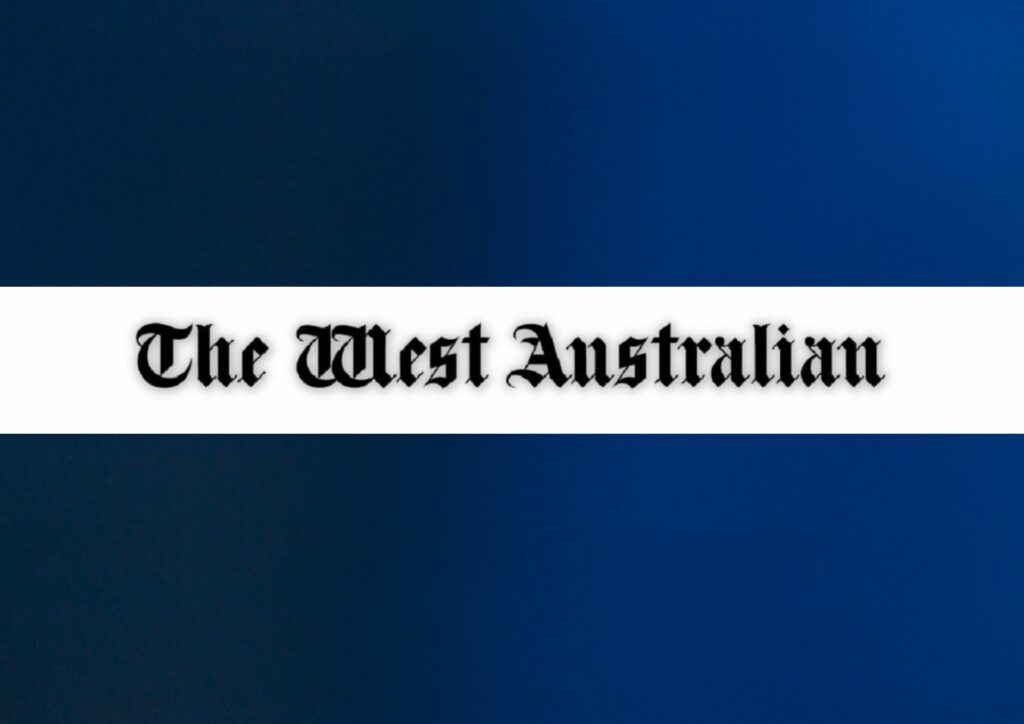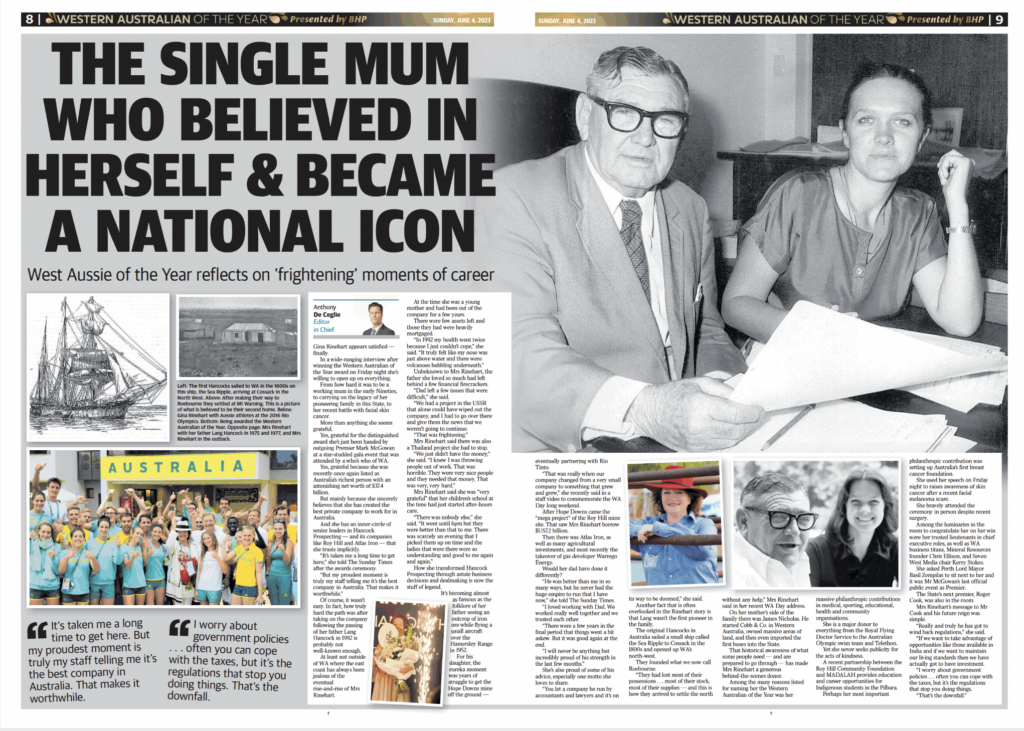

West Aussie of the Year reflects on ‘frightening’ moments of career
Gina Rinehart appears satisfied — finally.
In a wide-ranging interview after winning the Western Australian of the Year award on Friday night she’s willing to open up on everything.
From how hard it was to be a working mum in the early Nineties, to carrying on the legacy of her pioneering family in this State, to her recent battle with facial skin cancer.
More than anything she seems grateful.
Yes, grateful for the distinguished award she’s just been handed by outgoing Premier Mark McGowan at a star-studded gala event that was attended by a who’s who of WA.
Yes, grateful because she was recently once again listed as Australia’s richest person with an astonishing net worth of $37.4 billion.
But mainly because she sincerely believes that she has created the best private company to work for in Australia.
And she has an inner-circle of senior leaders in Hancock Prospecting — and its companies like Roy Hill and Atlas Iron — that she trusts implicitly.
“It’s taken me a long time to get here,” she told The Sunday Times after the awards ceremony.
“But my proudest moment is truly my staff telling me it’s the best company in Australia. That makes it worthwhile.”
Of course, it wasn’t easy. In fact, how truly hard the path was after taking on the company following the passing of her father Lang Hancock in 1992 is probably not well-known enough.
At least not outside of WA where the east coast has always been jealous of the eventual rise-and-rise of Mrs Rinehart.
At the time she was a young mother and had been out of the company for a few years.
There were few assets left and those they had were heavily mortgaged.
“In 1992 my health went twice because I just couldn’t cope,” she said. “It truly felt like my nose was just above water and there were volcanoes bubbling underneath.”
Unbeknown to Mrs Rinehart, the father she loved so much had left behind a few financial firecrackers.
“Dad left a few issues that were difficult,” she said.
“We had a project in the USSR that alone could have wiped out the company, and I had to go over there and give them the news that we weren’t going to continue.
“That was frightening.”
Mrs Rinehart said there was also a Thailand project she had to stop.
“We just didn’t have the money,” she said. “I knew I was throwing people out of work. That was horrible. They were very nice people and they needed that money. That was very, very hard.”
Mrs Rinehart said she was “very grateful” that her children’s school at the time had just started after-hours care.
“There was nobody else,” she said. “It went until 6pm but they were better than that to me. There was scarcely an evening that I picked them up on time and the ladies that were there were so understanding and good to me again and again.”
How she transformed Hancock Prospecting through astute business decisions and dealmaking is now the stuff of legend. It’s becoming almost as famous as the folklore of her father seeing an outcrop of iron ore while flying a small aircraft over the Hamersley Range in 1952.
For his daughter, the eureka moment was years of struggle to get the Hope Downs mine off the ground eventually partnering with Rio Tinto.
“That was really when our company changed from a very small company to something that grew and grew,” she recently said in a staff video to commemorate the WA Day long weekend.
After Hope Downs came the “mega project” of the Roy Hill mine site. That saw Mrs Rinehart borrow $US7.2 billion.
Then there was Atlas Iron, as well as many agricultural investments, and most recently the takeover of gas developer Warrego Energy.
Would her dad have done it differently?
“He was better than me in so many ways, but he never had the huge empire to run that I have now,” she told The Sunday Times.
“I loved working with Dad. We worked really well together and we trusted each other.
“There were a few years in the final period that things went a bit askew. But it was good again at the end.
“I will never be anything but incredibly proud of his strength in the last few months.”
She’s also proud of some of his advice, especially one motto she loves to share.
“You let a company be run by accountants and lawyers and it’s on its way to be doomed,” she said.
Another fact that is often overlooked in the Rinehart story is that Lang wasn’t the first pioneer in the family.
The original Hancocks in Australia sailed a small ship called the Sea Ripple to Cossack in the 1800s and opened up WA’s north-west.
They founded what we now call Roebourne.
“They had lost most of their possessions . . . most of their stock, most of their supplies — and this is how they arrived to settle the north without any help,” Mrs Rinehart said in her recent WA Day address.
On her mother’s side of the family there was James Nicholas. He started Cobb & Co. in Western Australia, owned massive areas of land, and then even imported the first buses into the State.
That historical awareness of what some people need — and are prepared to go through — has made Mrs Rinehart a generous behind-the-scenes donor.
Among the many reasons listed for naming her the Western Australian of the Year was her massive philanthropic contributions in medical, sporting, educational, health and community organisations.
She is a major donor to everything from the Royal Flying Doctor Service to the Australian Olympic swim team and Telethon.
Yet she never seeks publicity for the acts of kindness.
A recent partnership between the Roy Hill Community Foundation and MADALAH provides education and career opportunities for Indigenous students in the Pilbara.
Perhaps her most important philanthropic contribution was setting up Australia’s first breast cancer foundation.
She used her speech on Friday night to raises awareness of skin cancer after a recent facial melanoma scare.
She bravely attended the ceremony in person despite recent surgery.
Among the luminaries in the room to congratulate her on her win were her trusted lieutenants in chief executive roles, as well as WA business titans, Mineral Resources founder Chris Ellison, and Seven West Media chair Kerry Stokes.
She asked Perth Lord Mayor Basil Zempilas to sit next to her and it was Mr McGowan’s last official public event as Premier.
The State’s next premier, Roger Cook, was also in the room.
Mrs Rinehart’s message to Mr Cook and his future reign was simple.
“Really and truly he has got to wind back regulations,” she said.
“If we want to take advantage of opportunities like those available in India and if we want to maintain our living standards then we have actually got to have investment.
“I worry about government policies . . . often you can cope with the taxes, but it’s the regulations that stop you doing things.
“That’s the downfall.”















